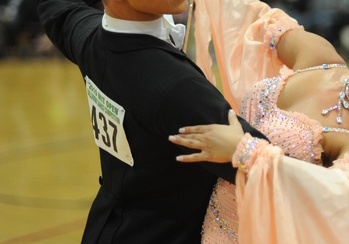Do Dance Competitions Elevate or Deflate the Dance World?
 Dance competitions have become more and more popular over the years and can be found for all different styles of dance. I’ve participated in my share of dance competitions including two separate dance competitions this week alone! I’ve also been a judge in dance competitions. I personally have mixed feelings about the purpose of dance competitions and what they achieve in the dance world. Here’s my take on how dance competitions both elevate and deflate the dance world.
Dance competitions have become more and more popular over the years and can be found for all different styles of dance. I’ve participated in my share of dance competitions including two separate dance competitions this week alone! I’ve also been a judge in dance competitions. I personally have mixed feelings about the purpose of dance competitions and what they achieve in the dance world. Here’s my take on how dance competitions both elevate and deflate the dance world.
Dance Elevation
Dance competitions are great because they can push a dancer to work harder in their personal craft in preparation for the competition. I know that when I’m going to be critiqued and graded on a performance, I will put more effort into making that performance better. Sometimes I will also research what else is going on in that field of dance to gain an understanding of what the world’s current standard is. In that regard, research in preparation for a competition can make a dancer more knowledgeable. Competitions have the ability to motivate dancers to be better. That being said, there are other events and shows a dancer could prepare for that could give the same motivation to a dancer without them having to be evaluated with a scorecard.
Competitions can also help a dancer gain visibility and ultimately promote a dancer’s career or journey in dance. So You Think You Can Dance is a great example of how young dancers have found a platform to fame and recognition. Often times dancers on this show gain a following as well as job opportunities even if they weren’t their season’s ultimate winner. I’ve discovered many of my favorite dancers through watching dance competitions on TV, in person, or online. When I was a finalist on reality Bellydance competition show Project Bellydance, I received shout outs from international dancers. It was an amazing opportunity for me to connect with dancers from around the world. In this same respect, competitions can connect dancers and promote networking in the dance community.
The prize can be a positive outcome of a dance competition. Some competitions offer trophy’s, awards, teaching opportunities, performing opportunities, travel and more to their winners. While the tangible prizes can be quite attractive, I get the feeling that most dancers are driven to win recognition and future opportunities.
Finally, dance competitions can elevate dancing as a whole. They create a standard of excellence and promote dancing as something that should be worked at and crafted. Dance competitions can also expose styles of dance to viewers who may have never appreciated of known about them before. Dance competitions create exposure and new prospects for dancers and the dance world.
Dance Deflation
Dance is an art. How can one judge something that is inherently supposed to be subjunctive and emote feeling? What deems someone of being capable of being a judge and why are they chosen? How are the standards of dance excellence calibrated? The concept of dance competitions raises a lot of questions for me. This may be because I have competed primarily in belly dance where there is no worldwide curriculum. In the ballroom dance world, there is an agreed upon curriculum in both International and American syllabuses. Yet, this then leads me to ask, who created these curriculums and why were they designed the way they were? I believe this is why there are so many discrepancies and different beliefs about styling and ballroom dance in general. Why are we trained to believe that one type of movement is “better” than another? A whole can of moral dance philosophy could be opened to debate this subject and a novel could be written on this topic alone.
Another downfall of competitions is that they cost money. Competition enrollment, dance costumes, make-up, dance shoes, and dance instruction and studio space can all cost a pretty penny. Competing in dance is an investment, and unfortunately not everyone can afford competing. This makes dance competitions inaccessible to everyone.
Dance competitions can also invite a world of moral misconduct and politics. Whether intentional or not, judges who know a competitor ahead of time may consciously or unconsciously give better or worse scores to that dancer. Schmoozing with judges is not a fair tool for getting a better competition score, but it happens often. Also human error and outright competition rigging creates big problems in the competition world. If numbers are added incorrectly, someone’s fate could be mishandled. Competition rigging also can affect a dancer’s competition. I know of a dance competition where the organizer awarded one dancer the prize instead of another contender because it was a cheaper outcome for the organizer. The award involved a dance opportunity with travel, and because one dancer lived closer, it was a cheaper prize to award. This is completely unfair and a disgusting code of conduct. While this type of behavior doesn’t happen all the time, it does exist and needs to be noted.
Poorly designed competitions create problems as well. I was once a judge for a dance competition in Taiwan. One of the categories I was judging was so open that the varying dance styles brought by each performance made it impossible to compare. It seemed unfair that the winner who chose a naturally more impactful style of dance took the prize over those who chose a fusion piece or more melodic solo. Also, competitions that provide no feedback for dancers do not give them the chance to understand and grow from the scores they receive.
Finally, I’ve seen competitions leave dancers in tears. For those who work extremely hard and do not win or who receive harsh criticisms it can leave dancers feeling horrible about themselves and not wanting to dance ever again. It can also be embarrassing. Competitions can also invite cattiness among competitors, which does not create the supportive environment that should be fostered in the dance world. Competitors may compare themselves to the winner and ask why they are not like him or her instead of fostering their own unique style.
Final Note
Dance competitions can create a lot of good, bad, and in between. For those considering competing, I would say don’t do it to win. Compete with the intention of improving yourself and gaining from the experience. If you don’t score fantastically the first time, see if there are places you can grow and try again… or don’t. Competitions aren’t for everyone. If you can find growth and fun in the experience, go for it. If not, continue to dance because it brings you joy and fulfillment, not a number.
Article by Ziva

